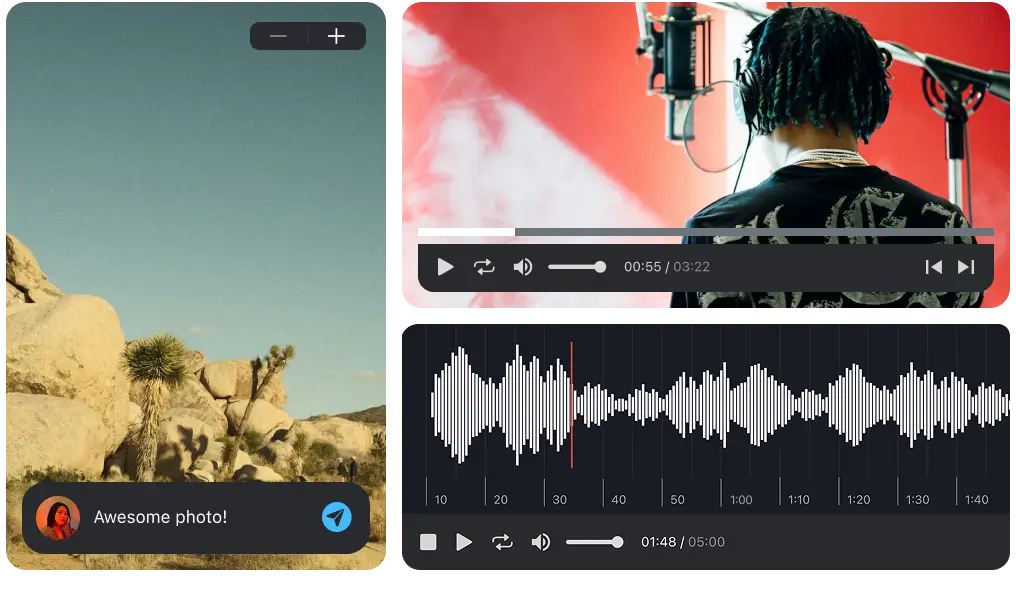As a universal, constantly-evolving language, music has reflected changing times and served as a medium for people to connect, regardless of their cultures and background. Technology has played a significant role in the evolution of music. From the first musical instruments to deepfake vocals, it’s safe to say that technology and music go hand in hand.
In recent months, AI and music have become a hot topic. Artificial intelligence is changing the way music is created, produced, distributed and consumed. In this article, we look at the complex link between AI and music production, and how this will shape the future of the music industry and music production.
What is artificial intelligence?
First things first – what exactly is artificial intelligence? Simply put, AI is the intelligence displayed by machines. It’s a branch of computer science that revolves around creating intelligent machines that simulate complex human behavior, such as problem solving, decision-making and learning.
There are various AI applications that we use on a daily basis. Web search engines like Google or recommendation systems such as Netflix are driven by AI that determines answers to popular questions and the TV series we’d like. Other popular AI applications include generative or creative tools like ChatGPT and Bard, which can create media based on prompts.
AI and music production: 4 ways it is changing music production forever
1. Automating workflows
One of the most obvious paradigm shifts in terms of AI and music production has been AI’s ability to automate workflows. Gone are the days when music producers waste time on repetitive tasks. Nowadays, producers can free up their time by automating repetitive tasks and focusing on creative and artist-centric tasks. Furthermore, these AI-assisted plugins not only make things easier for the producer, but also polish the track and create a more consistent sound.
For instance, AI-powered plugins can detect if a note is sang out of tune, and re-pitch it. Since its inception in 1997, auto-tune has revolutionized popular music. What was once a taboo is now routine in every studio around the world.
In addition to sound-based automation, AI is also an asset when it comes to file organization and management. Producers have to deal with a lot of large files. Therefore, having an AI-powered project management tool that can categorize files according to their name, date, BPM, artist and key is extremely useful and frees up precious time.
2. AI-generated instruments and vocals
You probably came across the viral video of David Guetta playing an EDM song with AI-generated Eminem verses. While controversial, AI-generated vocals are having a moment.
With AI tools, producers can now add incredibly realistic vocals to their track without having to work with a vocalist to sing on their track. This is, of course, extremely controversial and the aspect of intellectual property is still very murky. However, it can be a good way to test different vocal styles and timbres on a new track and determine which singer would work best for a track.
AI instruments are more commonly used and accepted. They can mimic the sound of any instrument in incredible detail and nuance. As a result, they allow producers working with a shoestring budget to incorporate different instruments without having to spend money on commissioning different musicians.
AI instruments also have the added benefit of being easy to edit and manipulate. Producers can edit a note and re-pitch it in seconds, which is incredibly useful when working with a tight deadline.
3. Music composition tool
If you’re currently experiencing writer’s block, you’ll be pleased to learn that AI can also be used as your music composition assistant. AI is designed to analyze hundreds of thousands of songs and generate new music that draws inspiration from the music it has analyzed.
AI music generators can be a great way to innovate and improve your creative process as a music producer. By using AI as a supplemental tool, you can explore genres and styles you haven’t thought of, or had the courage to explore before, and sprinkle them into your production.
Most AI music generators out there are currently open source, meaning that anyone can access and use them. Check out AI music generators such as Ecrett Music, AIVA and Amadeus Code to start implementing AI into your songwriting process.
4. Optimize your mix and master
AI technology is also revolutionizing mixing and mastering and helping producers quickly identify and fix audio issues. Thanks to machine learning algorithms, AI-powered tools have the ability to analyze files in seconds, identify problems in the mix and improve the overall quality of the master.
In addition, these tools can identify and remove unwanted noises and adjust levels to create a more balanced mix. Undoubtedly, this saves producers a lot of time and frees up their time to focus on more complex issues.
In addition to AI-powered tools, there are also fully AI mastering tools, such as LANDR and eMastered, which use machine learning and deep learning algorithms to automate the mastering process. These tools typically give the user the option to choose a preset and the song genre, which are later used by the AI to determine which mastering process to use.
Automating workflows for music producers
Having an efficient workflow can make all the difference in a fast-paced industry like the music industry. With Pibox, you can eliminate any hangups and focus on the thing that ultimately matters the most: quality music production.
Pibox enables you to automate workflows, store and share files, delegate tasks and manage task statuses, add team members and clients and so much more. This is not only cost-effective and time-effective, but ultimately means a high-quality product that everyone involved is happy with. Try Pibox today to experience next-level productivity yourself.
Easier, faster way to collaborate in real-time, collect feedback, manage reviews, share, and finish your projects effortlessly.









